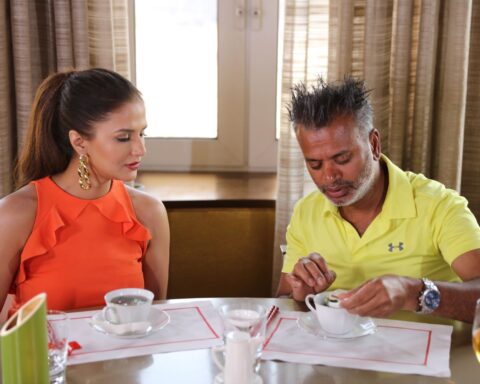We might be biased since we’re Canada’s documentary magazine, but POV thinks that the films competing for Documentary, Short Subject offer one of the stronger categories of contenders at this year’s Academy Awards. All five films have worthy subject matter, while the delivery varies from traditional to ingenious. Four of the five nominees draw from a key conversation with a central subject. Those four docs, however, take different approaches to form and content, which makes it fairly easy for a viewer to separate the sheep from the goats. Let’s start with the weaker films and slowly build towards the potential winners.
Chau, Beyond the Lines (Dir. Courtney Marsh; USA/Vietnam, 34 min.) brings a touching subject to the screen, but the film’s rudimentary production values force the viewer’s interest in Chau to hinge on one’s emotional connection to the subject. Marsh’s doc offers a portrait of a Vietnamese teenager named Chau, who lives with physical disabilities that result from the disastrous assault of Agent Orange herbicide by the Americans during the Vietnam War. Chau follows its subject as he lives in an orphanage with fellow victims of Agent Orange where the boy tells the camera how he dreams of being an artist. The film shows the daily efforts he makes to become independent and self-sufficient as he leaves the orphanage, moves out into the world, and becomes a professional painter. One cannot deny the sentimental subject matter, but it’s impossible to overlook the filmmaker’s limited technique.
Body Team 12 (Dir. David Darg; Liberia, 13 min.), on the other hand, offers an urgently shot character study of Garmai Sumo, a woman who works with the Red Cross in Liberia as part of a team that removes the bodies of Ebola victims from houses. Working in sites of death and infection displays laudable courage for both the body team and the filmmakers. One feels the sweaty sense of panic that pulses through Body Team 12 as the workers guard themselves against infection. Even more compelling is their work with emotionally stricken families of Ebola victims as they convince the bereaved to deny their loved ones a burial for the good of the community. At a slight 13 minutes, Body Team 12 leaves something to be desired as it only touches the surface of an important topic, but the film communicates the value of education and prevention in dealing with a dreadful disease. The filmmaker’s effort to extend Garmai’s story into a larger case study in feminism is also admirable.
Body Team 12 is strong, but fellow nominees Last Day of Freedom (Dir. Dee Hibbert-Jones & Nomi Talisman; USA, 32 min.) and Claude Lanzmann: Spectres of the Shoah (Dir. Adam Benzine; USA/Canada/UK, 40 min.) are far more successful works, Last Day of Freedom delivers a powerful study in guilt, loss, and forgiveness as Bill Babbitt recounts the story of his younger brother, Manny, who died by the death penalty. Babbitt explains how Manny never had an easy life, but his experiences grew worse when he went to Vietnam and returned greatly affected by post-traumatic stress disorder. Babbitt recalls the lack of resources that were at Manny’s disposal as his conditioned worsened. Even more gripping is the act in the story in which Babbitt explains how he made the difficult choice to give Manny over to the police when his brother killed a woman and, in turn, put his own family at risk. Last Day of Freedom uses the Babbitts’ story to confront the failures of America’s commitment to its veterans, as well as the shortcomings in the legal system that allow a mentally ill man to be put to death. The film conveys the weight of Bill’s burden through sparse animation that lets the viewer fill in the frame with the unfathomable experience of watching a family member crumble. The use of animation emphasizes the guilt and pain that resonates in Bill Babbitt’s voice as he, too, breaks down while telling this tragic story. The approach is bold, meditative, frank, and refreshing.
Claude Lanzmann: Spectres of the Shoah is a refined, polished, and tightly constructed documentary. This revealing film offers a deep conversation with filmmaker Claude Lanzmann as he revisits his experience making the 1985 documentary landmark Shoah, a near-ten-hour epic that many consider the definitive non-fiction film about the Holocaust. One doesn’t need to have seen Shoah in order to appreciate this immersive study, for Lanzmann’s answers are vivid and detailed, while the film brings an extraordinary breadth of visual research (including unseen footage shot for the original doc) that lets the viewer experience the images that make the film so powerful. Excerpts from Shoah are substantial when necessary, particularly one interview sequence in which Lanzmann asks a former member of the Sonderkommando (like Saul in Son of Saul, who worked at the gas chambers) to recall his experience in the camps while performing a haircut in the present. Lanzmann’s own thoughts frame this sequence quite powerfully as the barber offers cold, clinical answers, but can barely contain himself from falling apart when the director repeatedly asks him to describe his feelings.
The film captures the burden of responsibility one assumes while undertaking a film like Shoah by allowing Lanzmann’s own composure to show the understandable pressure and strain he has had to experience. Overall, the film is a handsome, dignified portrait of the filmmaker by DP Alex Ordanis, which grants the subject esteem and authority. Lanzmann also benefits greatly from Benzine’s experience as a journalist (he was the editor of fellow doc mag Realscreen prior to making the film) as his docu-profile offers a truly engaging interview.. It helps that Claude Lanzmann, like Bill Babbitt, is a strong speaker who isn’t afraid to say exactly what he feels, but the film also presses its subject far better than the other short Oscar-nominated docs do. Take, for example, a pivotal moment in the film in which Benzine asks Lanzmann to recall a day when he and a colleague had an interview with a Nazi who detected their covert filmmaking and reacted violently. Lanzmann initially brushes the question aside and offers a mix of excuses to avoid the topic. However, with a little prodding from Benzine, he eventually opens up about the story and releases a great deal of anguish the he’s carried since undertaking the monumental task of making Shoah. The effect turns Lanzmann’s own masterful interview skills back on him, reviving the spirit of Shoah for an intimate and revealing confession that one cannot find in the history books.
Finally, The Girl in the River: The Price of Forgiveness (Dir. Sharmeen Obaid-Chinoy; Pakistan, 40 min.) undertakes a range of interviews with various parties implicated in a case of brutal violence and uses the diverse voices to recreate a collective crime. The Canadian-Pakistani Obaid-Chinoy, who previously won the Oscar in this category for 2012’s Saving Face, investigates the case of a young woman named Saba, who was shot by her father and uncle in an attempted honour killing. The crime is one that claims over 1000 women in Pakistan each year, but Saba is a rare survivor who gets to face her family again. The film lets Saba give a voice to the many women who are victims of violence as she recovers from the attempted murder and conveys the grief, guilt, betrayal, and fear that compound her situation as she faces an important decision. The legal case rests on Saba’s willingness to forgive her family, for the film explains that the victims of honour crimes (or the families of deceased victims) may absolve the aggressors, which acquits them of charges. Interviews with Saba’s family and the men in the community illuminate the stress that a woman like Saba would experience as pressures mount to excuse her father. At the same time, her lawyer and an investigator of honour killings explain how her testimony offers an invaluable opportunity to let a victim of violence empower the women of Pakistan by refusing to capitulate to tradition. The Girl in the River boldly tackles this vital subject from all angles. It gives both sides a chance to express themselves, making the complexity of the situation apparent as speakers, particularly several women, reveal how much they internalize their ancient traditions. The distressing finale invites empathy, compassion, and anger.
Overall, this year’s Oscar-nominated documentary shorts are an impressive class of films.
The Oscar Short Docs are being shown in Toronto at TIFF Lightbox except for The Girl in the River, which can’t be screened theatrically in Canada due to rights issues.
The films will be available on iTunes later this month.










